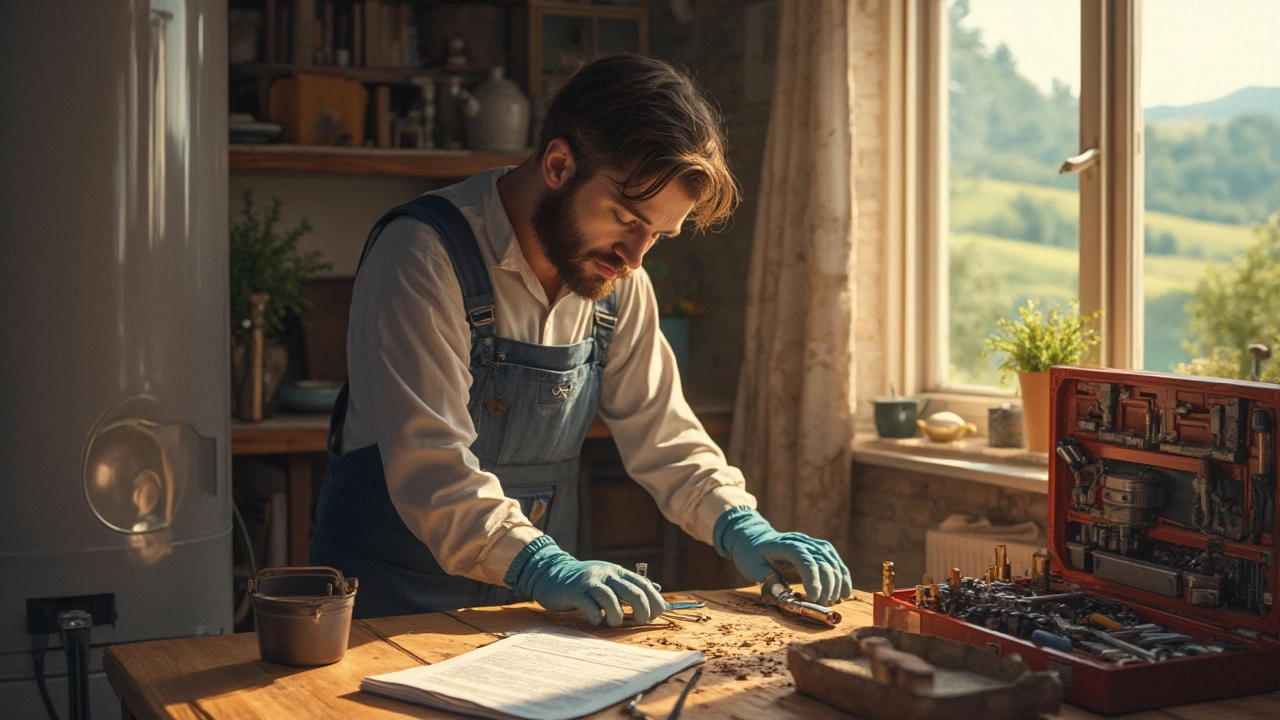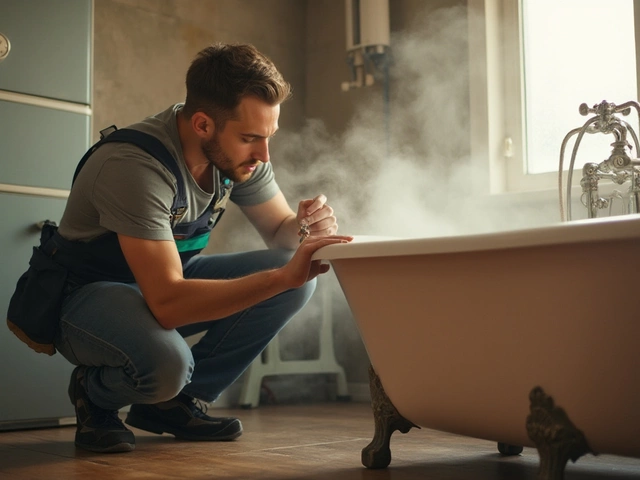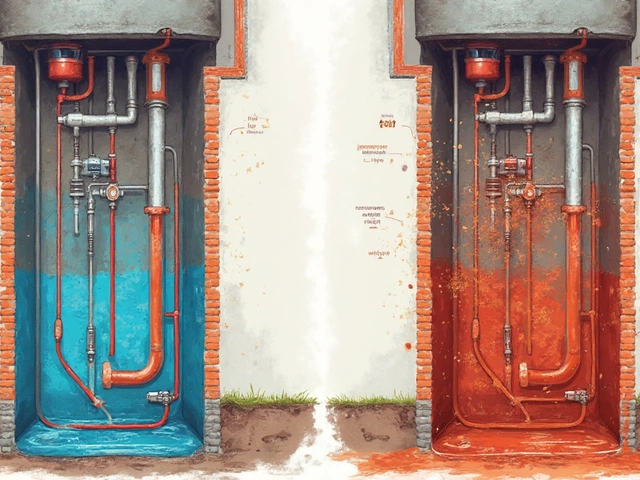Dealing with a broken water heater is like waking up to a cold shower—literally and figuratively. The idea of fixing it yourself can sound appealing, especially when considering the potential cost of hiring a professional. But is it really a DIY job? Let's dive into a few things you should think about before you grab your tools.
First up, you need to figure out what's really wrong with your heater. There's the usual suspects like no hot water, leaks, or funny noises. Each issue could mean a different fix—some are super simple, like relighting a pilot light, while others might need a pro's touch.
Safety should be your top priority. Water heaters deal with electricity, gas, and lots of hot water. A slip-up here could lead to bad burns or even explosions. If you're not 100% sure what you're doing, it might be worth calling in a professional just to be safe.
Common Water Heater Issues
Water heaters can run into a few bumps along the way, and knowing these quirks can help you decide if it's a job you can handle or one for the pros. Let's go through some of the usual issues you might find with your trusty heater.
1. No Hot Water
This is probably one of the most obvious signs something's up. It could be something simple like the pilot light being out, so your first step should be to check it. For electric heaters, a tripped circuit breaker might be the culprit. A quick flick might do the trick. But if you're still in the cold, you might have a faulty thermostat or heating element on your hands.
2. Leaking Water Heater
A leak doesn't always mean your heater is doomed. Often, it's just a loose valve or bad connection. Check all visible pipes and connections. If everything's tight and it's still leaking, the tank could be corroded, especially if it's been around the block a few times.
3. Strange Noises
If your water heater sounds like it's got a band playing, it might just be sediment buildup. Over time, minerals settle at the bottom of the tank, and when heated, they cause popping or rumbling sounds. Draining and flushing the tank might quiet things down. If the noise persists, it might be more serious.
4. Smelly Water
A smell reminiscent of rotten eggs usually points to bacteria in the tank. This happens more in tanks not used for a while. Flushing the tank and treating it with hydrogen peroxide should clear it up. If not, it might be time for a new anode rod.
Here's a quick look at how these water heater repair issues break down:
| Issue | Possible Causes | DIY Potential |
|---|---|---|
| No Hot Water | Pilot light out, tripped breaker, thermostat, or heater element | Medium |
| Leaking | Loose valve, corroded tank | Medium to Hard |
| Noises | Sediment buildup | Easy to Medium |
| Smelly Water | Bacteria growth | Medium |
Understanding these issues can save you from a freezing shower or worse, a flooded basement. If ever in doubt, don't hesitate to reach out to a professional. They might just save you time and further headaches.
Safety Concerns
When it comes to water heater repair, safety isn't just a suggestion—it's a necessity. These appliances operate using either gas or electricity, both of which can be dangerous if mishandled. Let's break down a few important safety measures.
Handling Gas Water Heaters
If your water heater runs on gas, the biggest red flag is a gas leak. A rotten egg smell is a classic sign. In case you detect that, evacuate everyone immediately and contact your gas company. It's no place for DIY heroics.
Dealing with Electricity
For electric water heaters, always shut off the power at the breaker before you do anything else. Electricity and water are old enemies. Touching anything with the power on could lead to a nasty shock.
Hot Water Burns
Another concern is the temperature of the water. It can scald skin if it's too hot. Aim to set your water heater to about 120 degrees Fahrenheit to avoid burns, especially if kids are around.
Water Pressure
Excessive pressure is no joke; it can make your water heater a ticking time bomb. Check the pressure relief valve hitched on top or side of your heater. If it's acting up or leaking, you might need a new one.
Understanding these DIY water heater safety tips can make all the difference. If a step seems confusing or risky, remember that professionals have the training to keep things safe and under control.

When to DIY
Tackling a water heater repair yourself can be a great way to save some bucks, but it's not always cut and dry. So, when is it a smart move to roll up your sleeves and get your hands dirty?
Simple Fixes
If your water heater's pilot light has gone out, relighting it is definitely something you can handle on your own. Just remember to follow the instructions on the unit and make sure the area is ventilated properly to avoid any gas buildup.
Thermostat Issues
Sometimes the problem is simply a matter of adjusting the thermostat. If the water isn’t hot enough, check the thermostat settings. You want to aim for about 120°F. It's a small tweak that won't demand too much of your time.
Flushing the Tank
Over time, sediment can build up at the bottom of the tank, reducing efficiency. Draining a few gallons could be enough. Hook up a garden hose to the drain valve, let it cool, and then let it loose to flush those sediments out.
Replacing Minor Parts
If it's a matter of replacing little things like a heating element or a thermocouple, which are inexpensive and relatively easy to find at your local hardware store, then you're in DIY territory. Just make sure you know what you're replacing and buy the right parts.
Knowing Your Limits
Anything involving major plumbing work or the electrical aspects of the heater should probably make you think twice before diving in. Mistakes here can lead to bigger headaches down the road.
In a nutshell, small fixes are generally fair game for a DIYer. But for the more complex stuff, you might want to call in a professional, not just to ensure it's done right, but also to keep things safe.
| DIY Fix | Complexity | Tools Needed |
|---|---|---|
| Relighting Pilot | Low | None |
| Adjust Thermostat | Low | None |
| Flush Tank | Medium | Garden Hose |
| Replace Thermocouple | Medium | Wrench |
Hiring Professionals
Sometimes, the smartest move you can make for your water heater repair is picking up the phone and calling in the experts. Sure, it costs a bit more, but think about it this way: peace of mind, safety, and no smelly cold showers await you on the other side.
So, when should you definitely consider hiring a pro? If you notice serious issues like gas leaks, frequent breaker trips, or your heater is way past its lifespan (usually around 10-15 years), it’s a good idea to get professional help. Remember, they’ve got the skills, the special tools, and most importantly, the experience to handle any surprises that might pop up.
Why Choose an Expert?
Once you bring in the pros, you’re benefiting from their deep knowledge of water heater systems. They know the ins and outs, like which brands are more reliable or which models might be notorious for certain problems. A seasoned expert can also spot small issues before they turn into wallet-crushing disasters.
Finding the Right Professional
Looking for a trustworthy repair service doesn’t have to be a chore. Start by asking friends or family for recommendations—someone you know might’ve had a great experience with a local technician. Checking online reviews is another solid approach; just make sure to read a bunch to get a balanced view.
- Look for licensed technicians: A certification ensures they know what they’re doing.
- Get multiple quotes: Don’t just go with the first estimate. Comparing prices might save you some cash.
- Ask about warranties: Reputable companies often offer guarantees for their work, which can save you from future headaches.
Choosing to bring in a professional not only solves your immediate problem but can extend the lifespan of your water heater, ultimately saving you money in the long run. So, while the DIY route might seem tempting, sometimes a little extra expense up front pays off big time in the end.





